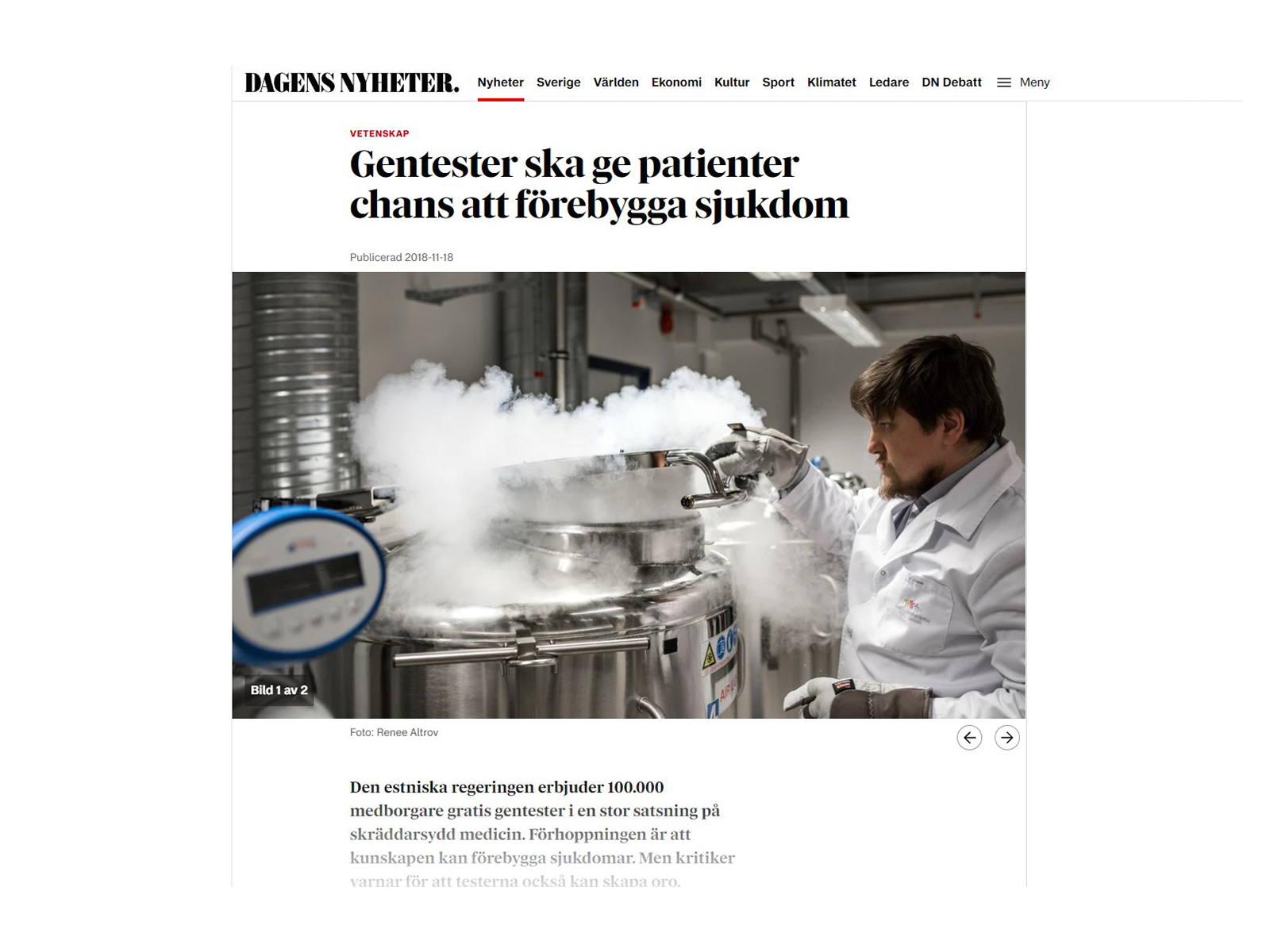
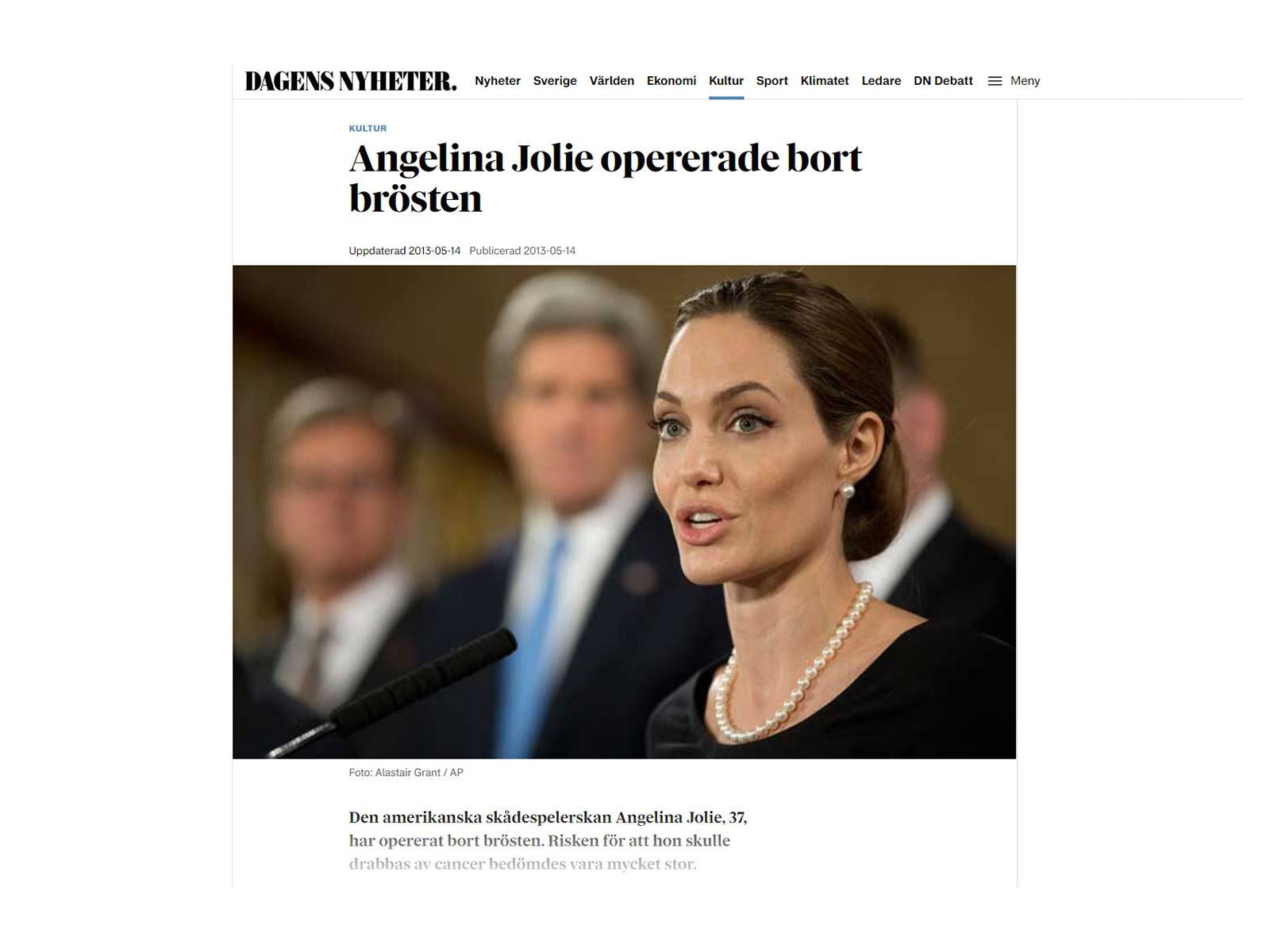
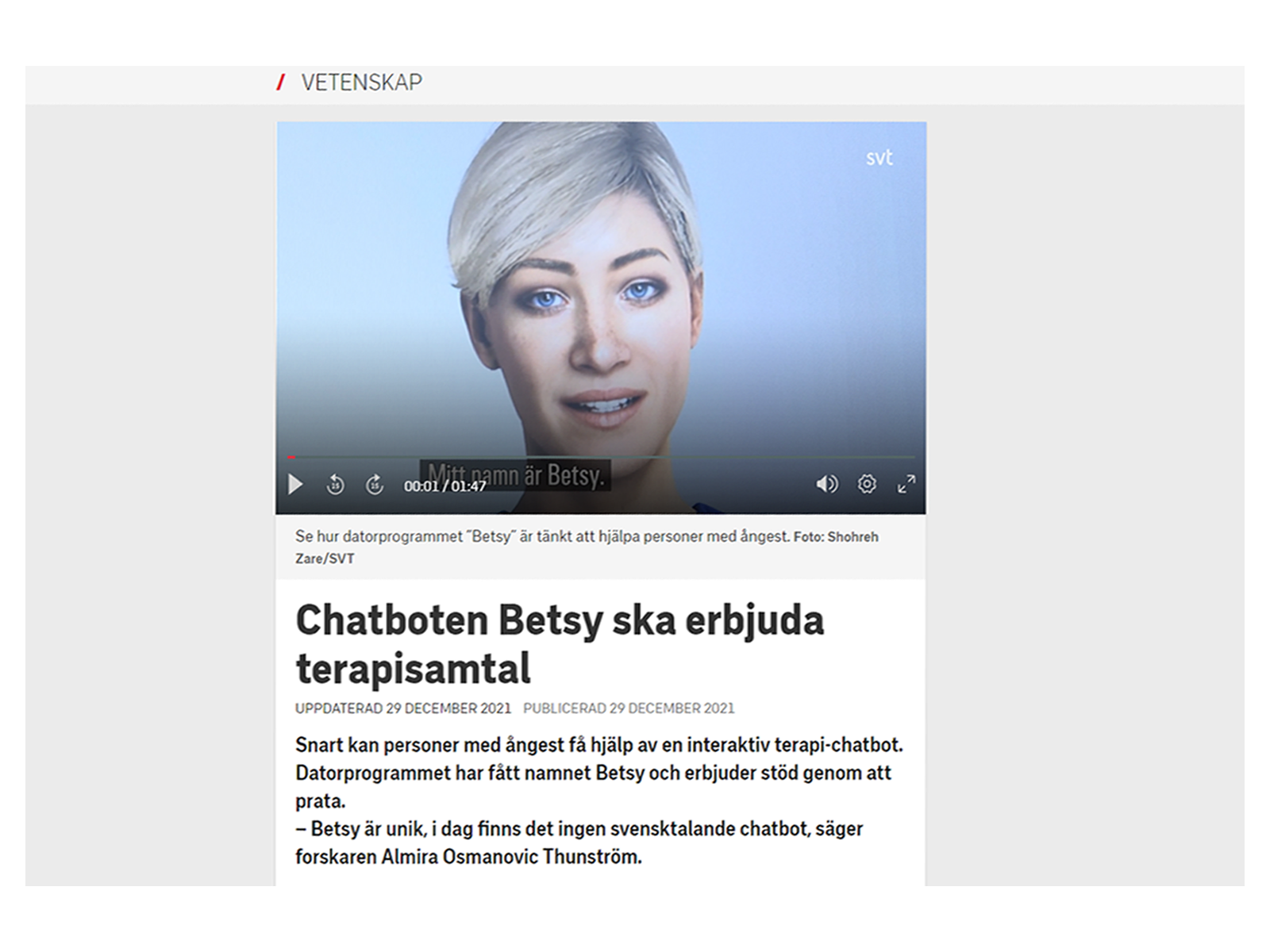
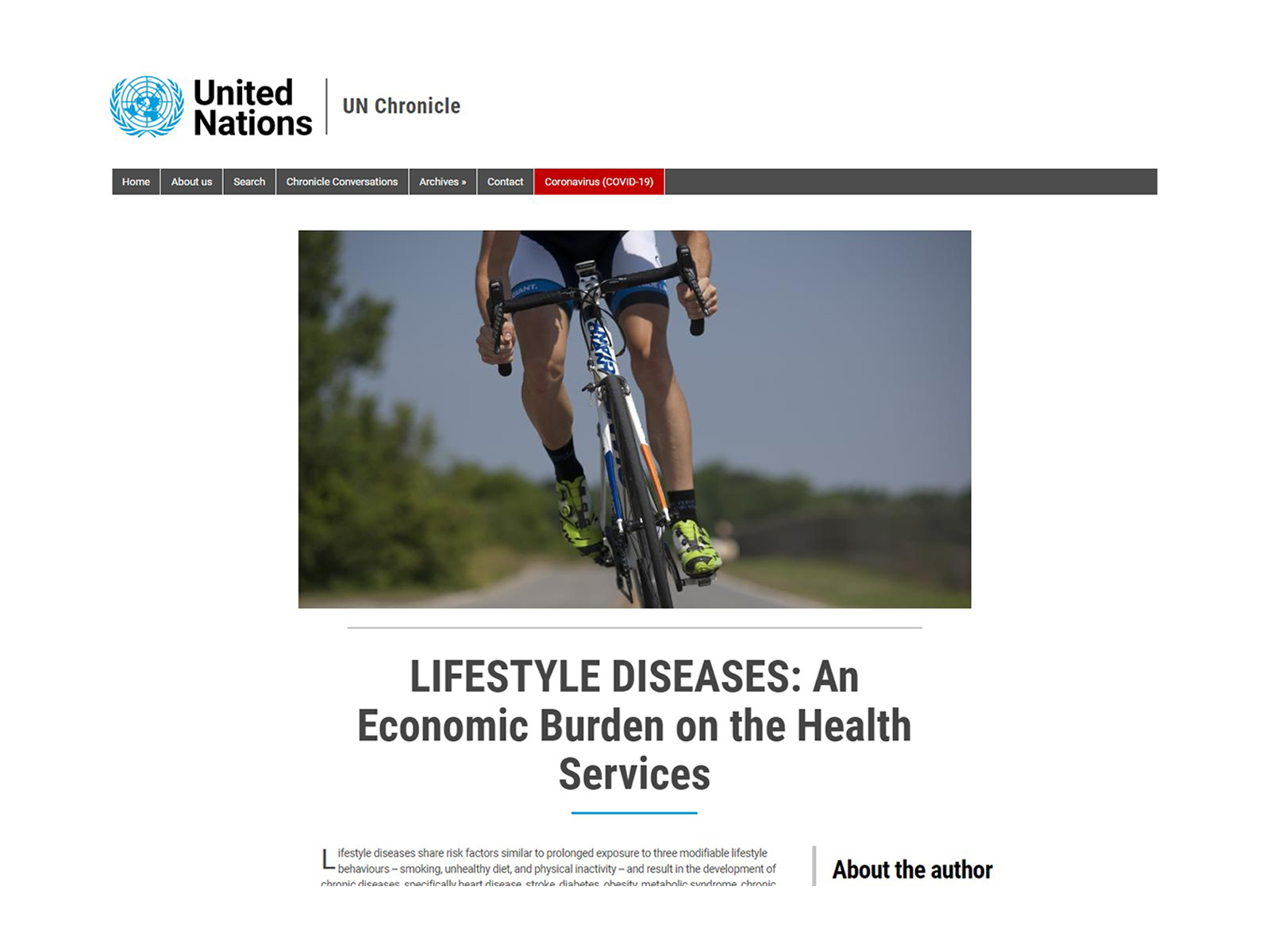
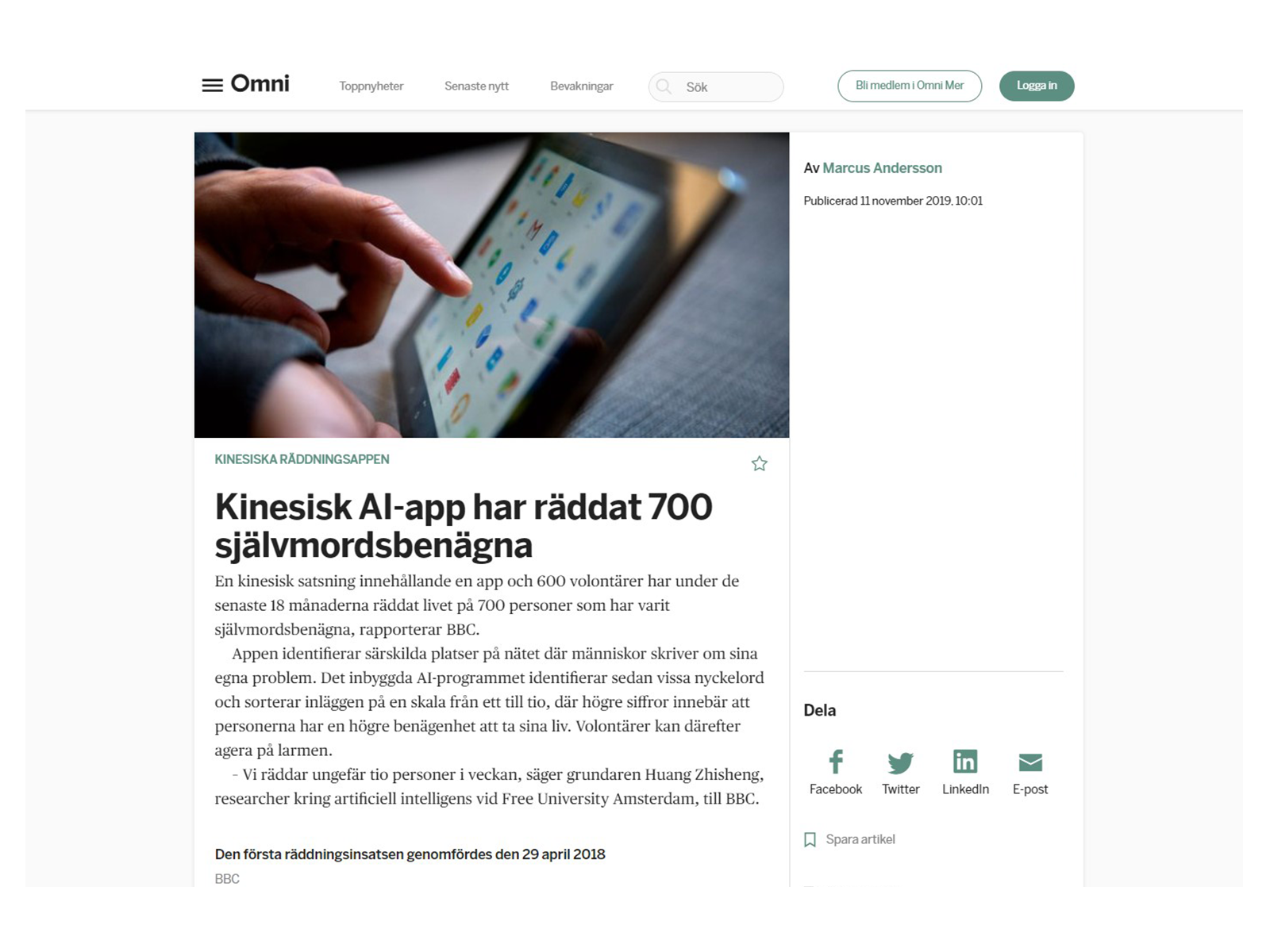
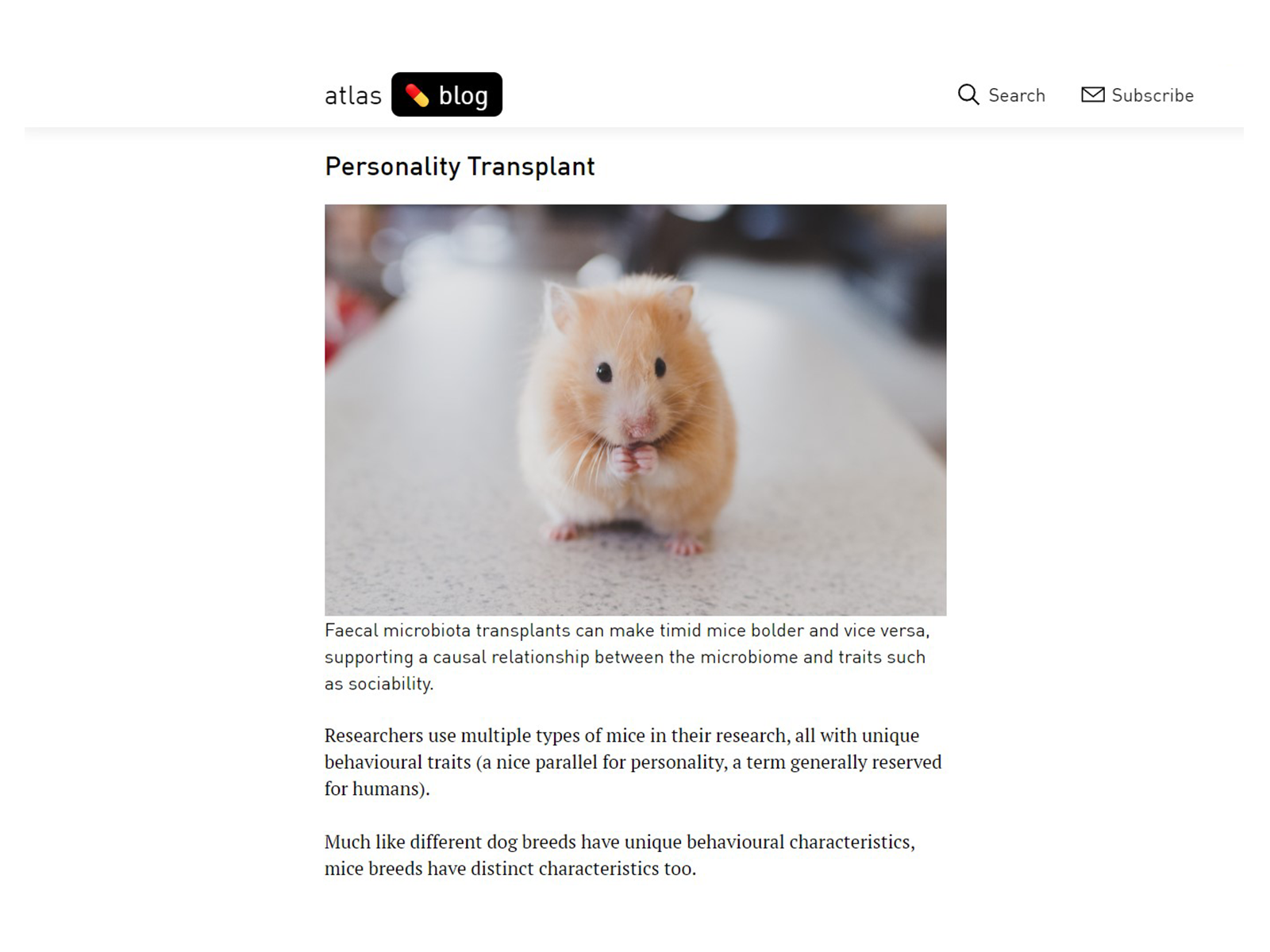
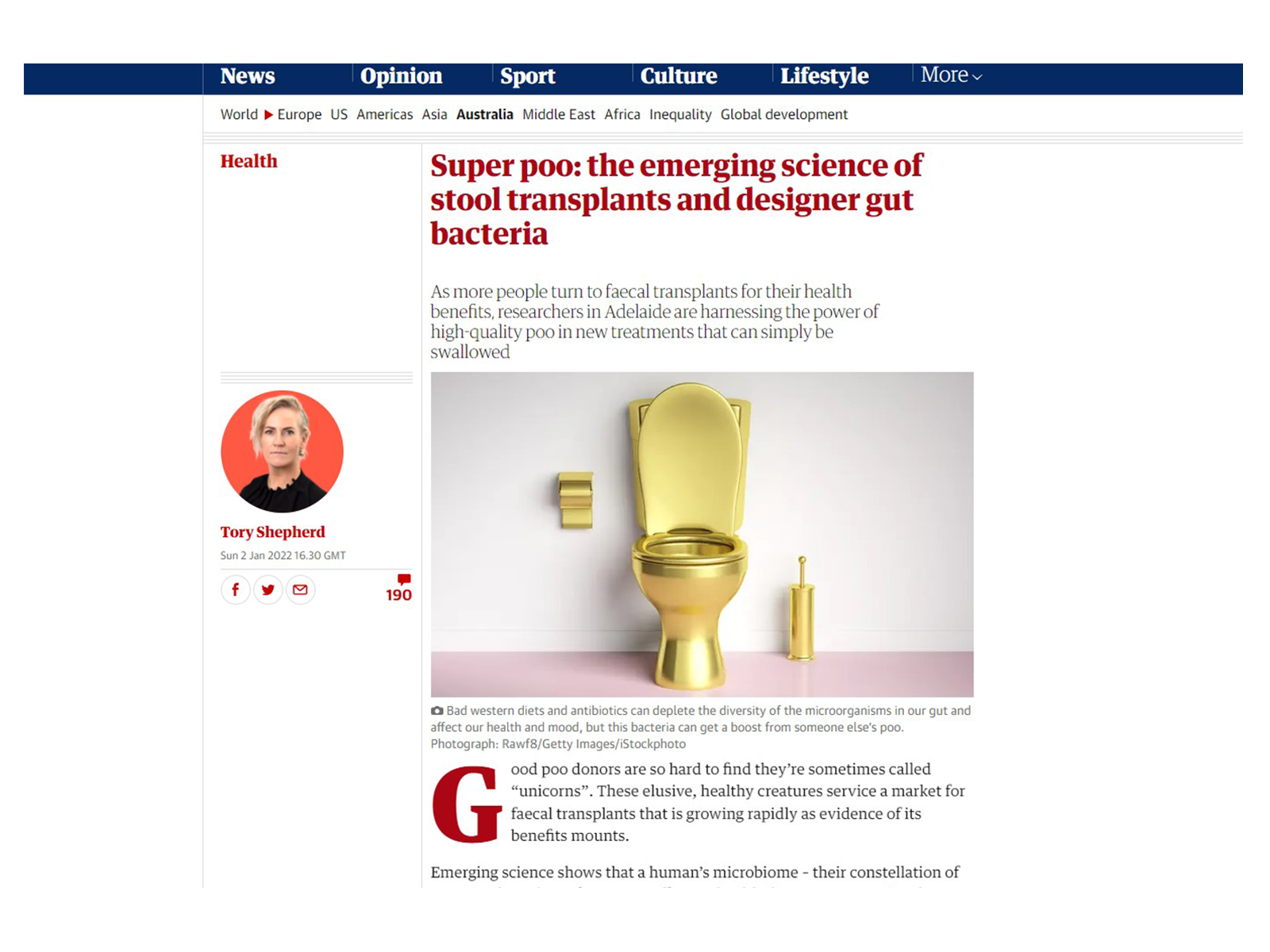
Trends & Signals
The Centre for Preventive Care explores various themes, trends and so-called weak signals. A trend is a general direction in which something is evolving or shifting. A weak signal is an initial indication of change or the emergence of a phenomenon that might be significant in the future. These signals tend to be more unexpected, surprising, new, and challenge current thinking.
Behind each part of the installation lies something we’ve read or heard about; it can be a news article mentioning a new behaviour, a new product, a movement, a development, an emerging technology or a scientific discovery. In this section we unpack the different themes and share some of these articles with you.
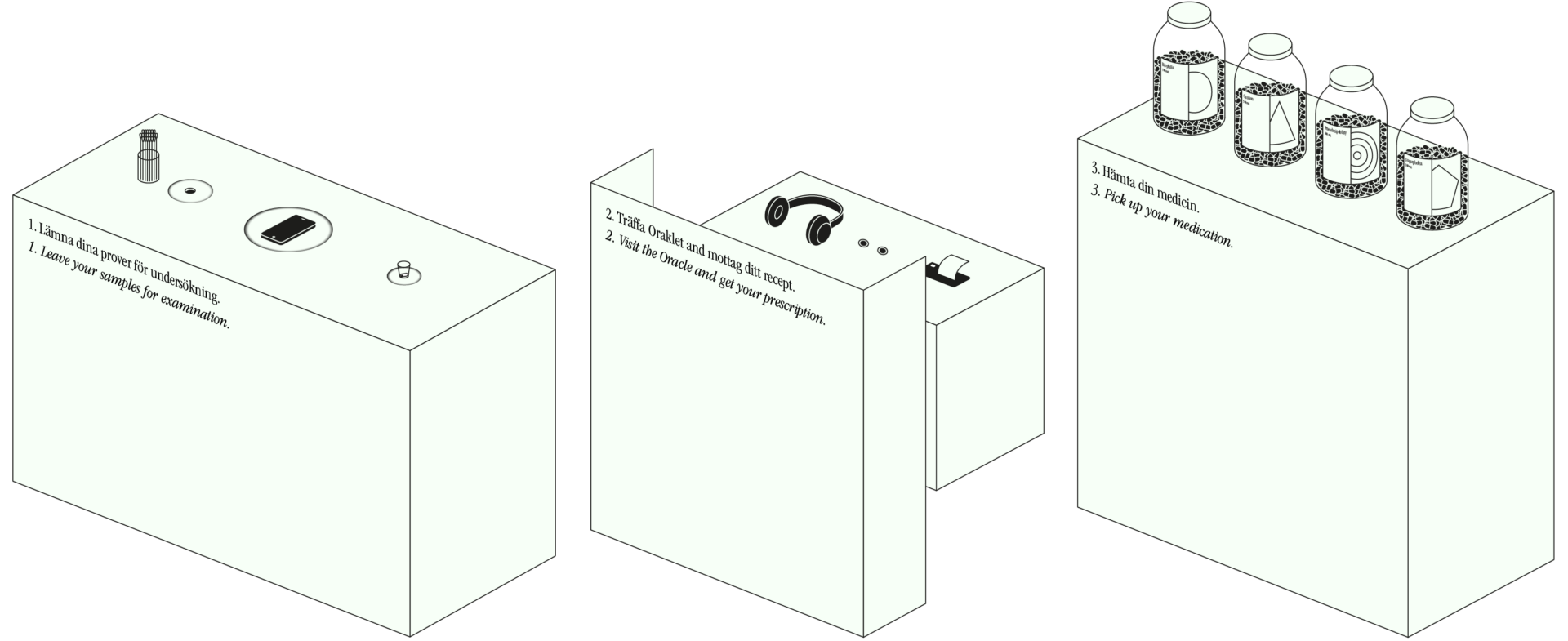
Prediction and prevention
The Centre for Preventive Care, set in the year 2052 promises its visitors to prevent illness and increase their chances of living a long and healthy life.
What’s behind?
Chronic diseases are a global public health issue. In Sweden, 85% of healthcare spending is allocated to treating chronic illnesses. The demand for healthcare exceeds the available staff, and this gap is expected to grow due to an aging population.
Many of these chronic conditions are driven by lifestyle factors and could be prevented. Today’s healthcare system focusses on reacting to symptoms rather than preventing diseases from breaking out in the first place, but calls for a shift towards precise, preventive, and personalized care are increasing.
Meanwhile, advancements in science and technology offer promises of improved health, longevity, and surpassing biological limits.
Explore the signals:
VIP i vården? – Om utmaningar i vården av personer med kronisk sjukdom (vardanalys.se)
Lidestyle Diseases: An Economic Burden on the Health Services (United Nations)
Prevention is better than cure: it’s time we value diagnostic information (MedTech Views)
Neko, Daniel Ek’s next play, is another spin on preventative healthcare (TechCrunch)
Egg-Freezing at Facebook, Apple, Google Hot New Perk (businessinsider.com)
Why ageing should be classified as a disease (theconversation.com)

Data sharing
In the first station visitors are asked to leave their samples for examination. The sampling consisted of a genetic sample, a digital sample and a micro-bacterial sample.
What’s Behind?
Genetic testing is on the rise, with companies offering insights into medical risks in return for someone’s most private information: their genetic code. While these initiatives hold potential for tailored treatment and preventive care, concerns about data safety, security, and ownership are emerging. Some countries, like Estonia, are even collecting DNA on a national level.
Our health is influenced by various factors beyond genetics, such as our address, income, activity level, social connections, and diet. Smart devices collect extensive data about our lifestyle and behaviors, including biometrics, location, search history, and vocal patterns. In the age of big data and algorithms, this information is increasingly used for early disease detection. For example, AI can predict suicide attempts based on social media posts, vocal patterns can reveal post-traumatic stress disorder, and tracking walking speed can identify Parkinson’s disease up to seven years earlier.
We’re gaining more understanding of the human microbiome and its connections to various ailments, leading more people to explore fecal transplants for health benefits. Additionally, a swallowable sensor shows promise in revolutionizing the diagnosis, prevention, and treatment of gastrointestinal disorders.
Explore the signals:
How Well Can a Genetic Test Predict Your Future Health? (Scientific American Blog Network)
How to Protect Your DNA Data Before and After Taking an at-Home Test (nytimes.com)
Estonia To Offer Free Genetic Testing, And Other Nations May Follow (futurism.com)
China’s massive effort to collect its people’s DNA concerns scientists (nature.com)
Why Zip Code May Influence Health More Than Genetic Code (newsweek.com)
Personal Data Collection: The Complete WIRED Guide (WIRED)
The Chinese suicides prevented by AI from afar (BBC News)
Do I sound sick? (The Lancet Digital Health)
Smartwatches can spot Parkinson’s 7 years before key symptoms appear — Study – Daily Trust
Super poo: the emerging science of stool transplants and designer gut bacteria (The Guardian)
Swallowable Sensors May Reveal Mysteries of Gut Health (Despatch)

Dataism, AI-doctors and invisible health threats
Visitors got to meet the Oracle, an all knowing AI who gives a personalized health prediction. The Oracle warned people for various conditions such as chronic loneliness, depression, cognitive decline or overexposure to threats like air pollution and microplastics.
What’s Behind?
In his book “Homo Deus” historian Yuval Noah Harari coined the term “Dataism” to describe the rise of big data as a new form of religion. Dataists believe that comprehensive systems, armed with abundant biometric data and computing power, can know individuals better than they know themselves. Critics fear that we are becoming cogs in a vast and incomprehensible system, with authority shifting from humans to algorithms.
Medical decisions are already being influenced by computer calculations, as seen in the case of Angelina Jolie, who underwent a preventive operation after a genetic test indicated an 87% risk of developing breast cancer. Technology allows for the detection of smaller abnormalities, but concerns arise regarding healthy individuals being turned into patients, generating unnecessary anxiety and expanding the treatment industry.
AI and digital humans possess the abilities to replace doctors, therapists, healthcare coaches, or companions. They can accurately diagnose diseases while displaying empathy, making individuals feel seen, heard, and understood.
New knowledge is continually being gained about health threats often overlooked. Loneliness has been linked to a reduction in lifespan comparable to smoking 15 cigarettes a day, while cognitive decline is associated with lack of social activity and the consumption of ultra-processed food. Air pollution, in particular, is a major cause of premature death and disease, representing the largest environmental health risk in Europe. Noise pollution is also linked to various conditions, including cardiovascular disease, type 2 diabetes and an increased risk of heart attacks. The recent discovery of microplastics as pollutants raises concerns, although their exact impact on health is not yet fully understood.
Explore the signals:
Yuval Noah Harari on big data, Google and the end of free will | Financial Times (ft.com)
Angelina Jolie’s Disclosure Highlights a Breast Cancer Dilemma – NYTimes.com
How genetic testing is swelling the ranks of the ‘worried well’ (theconversation.com)
Can Knowing Your Genetic Risk Change Your Physiology? – Scientific American
Chatboten Betsy ska erbjuda terapisamtal | SVT Nyheter
Who Will Take Care of Italy’s Older People? Robots, Maybe. – The New York Times (nytimes.com)
ChatGPT Is More Empathetic Than Doctors: Study (businessinsider.com)
Loneliness – a danger to our health | Karolinska Institutet (ki.se)
Protecting against cognitive decline – Harvard Health
Cutting back on ultra-processed foods linked with lower dementia risk – Harvard Health
How noise pollution may harm the heart – Harvard Health
Air pollution: how it affects our health — European Environment Agency (europa.eu)
Health effects of Microplastics & Pathogens – Plastic Health Coalition

Behaviour change
At the last station, visitors got to pick up their medication prescribed by the Oracle.
There were four different “behaviour changing pills”; Saccharophobia, which triggers a strong aversion towards sugary foods and drinks; Caution, which heightens your sense of alertness to danger; Friendshipability, which improves your capacity to interact and connect with others; and Biophilia which Intensifies your attraction to nature.
The pill came with the instruction to take it within 24 hours or it would be reported to the region of Stockholm.
What’s Behind?
While prescriptions have traditionally referred to medications, there is a growing trend of social prescribing. This involves healthcare professionals referring individuals to local, non-clinical services that address practical, social, and emotional needs affecting their health and well-being. Examples include surfing, dancing or spending time outdoors.
While many health recommendations are well-known, making healthy lifestyle changes is easier said than done. Even with strong motivation, adopting new habits or breaking old ones can be incredibly difficult. In Alaska, the Nuka system of care recognizes this. There, care professionals are trained to positively influence people by offering encouragement, advice, mentorship, and support, rather than the more traditional approach of solely providing diagnoses and treatment plans.
New evidence reveals the significant influence of our microbiota on brain and behavior. Swapping microbiota between mice resulted in personality changes, with shy mice becoming bolder and bold mice becoming more cautious. In a human case, a biohacker ingesting a friend’s feces to alleviate irritable bowel syndrome experienced improved symptoms but also developed an unexpected sugar craving, corresponding to the donor’s sweet tooth. This emerging understanding of the gut-brain relationship holds promise for future treatments and continues to be a focus of research.
Scientists are increasingly uncovering the potential of placebos. It was previously believed that placebo pills could only provide therapeutic benefits if patients were unaware that they received a placebo. However, intriguingly, the results of several small, randomized trials on open-label placebos indicate that patients can experience relief from symptoms even when they are aware that the pills they are taking do not contain any active medication.
Healthy choices are becoming intertwined with societal and economic factors, highlighting the increasing interdependence of individual decisions and collective welfare. The COVID-19 pandemic has demonstrated how governments can enforce measures like social distancing, mask-wearing, and vaccination through legal mandates. Additionally, insurance companies are now incentivizing individuals to utilize health trackers to monitor their lifestyle habits in exchange for premiums and discounts. Although participation is currently voluntary, there is a growing question of whether opting out will carry consequences, potentially eroding the freedom of individual choice over time.
Explore the signals:
Nature on prescription: wetlands project aims to boost mental health | Mental health | The Guardian
Gut bacteria linked to personality | University of Oxford
How gut bacteria are controlling your brain – BBC Future
The Personality Transplant | Psychology Today
After Ingesting Someone Else’s Feces, Biohacker Feels Like New Man | KQED
What happens when life insurance companies track fitness data? – The Verge